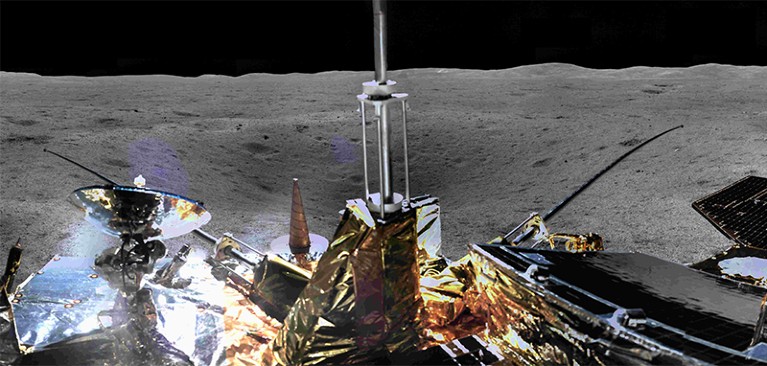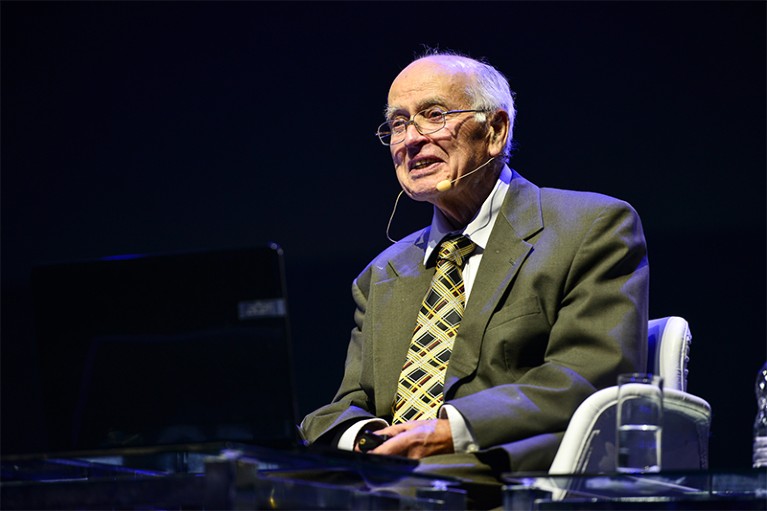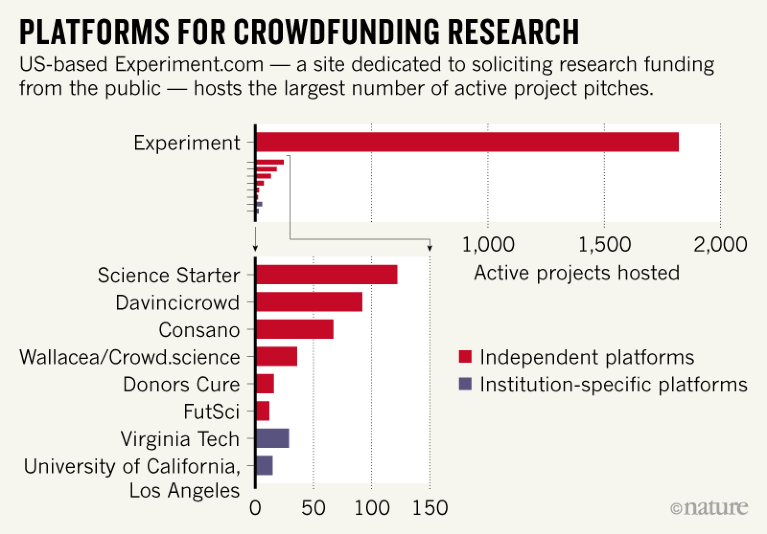SPACE
First panoramic views of Moon’s far side China’s Chang’e-4 lander took this panoramic view of the far side of the Moon on 11 January. Its six-wheeled rover, Yutu2, had woken up on 10 January, after a ‘nap’ scheduled to avoid overheating during the hottest period of the lunar day; the rover and Chang’e-4 took pictures and videos of each other. The images beamed back to Earth also show the first plant ever to sprout on the Moon, a cotton seed in a mini-biosphere experiment on Chang’e-4. The mission was the first to make a soft landing on the far side of the Moon, on 3 January. On 14 January, the China National Space Administration announced plans for at least three further lunar missions. The first of those, Chang’e-5, will launch before the end of this year, aiming to collect a sample of lunar material and return it to Earth.

A panoramic view of the Moon’s far side.Credit: Xinhua via Zuma
Hubble trouble One of the Hubble Space Telescope’s main instruments stopped working on 8 January because of an unspecified hardware problem, NASA says. The Wide Field Camera 3 is one of Hubble’s scientific workhorses. The telescope, which is almost 30 years old, has one other camera and two spectrographs that remain operational and will continue collecting data, NASA says. In October, Hubble stopped working entirely for three weeks after the failure of one of the gyroscopes that it uses to orient itself in space. Engineers fixed the problem, which required input from experts across NASA.
ENVIRONMENT
Carbon spike Carbon dioxide emissions in the United States soared by an estimated 3.4% in 2018, setting back efforts to curb global warming. The findings, published on 8 January, were based on a preliminary analysis of government and industry data by Rhodium Group, an independent research firm in New York City. The rise followed three consecutive years of decline in US emissions from fossil fuels. It is the second such spike in carbon-emission levels since 2010, when they increased after nearly two years of recession. This hitch in the decline of carbon emissions has made it more difficult for the United States to achieve its goal under the Paris climate agreement of cutting greenhouse-gas emissions by 26–28% below 2005 levels by 2025, according to the report.
FACILITIES
Brexit and fusion A UK-based nuclear-fusion facility that is largely funded by the European Union has secured a temporary extension to its contract that will allow it to run until 28 March — the day before Britain is scheduled to leave the EU. The Joint European Torus (JET) near Oxford is a test bed for the ITER fusion experiment under construction in France. JET’s funding contract with the European Commission — through which it received €56 million (US$64 million) a year from EU sources — ran out at the end of 2018. The EU plans to extend funding for the facility to the end of 2020 and could do so smoothly under a Brexit deal agreed last year between Britain and the EU, intended to come into force after 29 March. But the deal has proved unpopular among members of the UK Parliament, who, as Nature went to press on 15 January, were imminently set to vote on whether to approve it.
PUBLISHING
Editors quit Elsevier The 27-strong editorial board of the influential Journal of Informetrics resigned in protest over policies of its publisher, Elsevier, on 10 January, and launched a competing publication on 14 January. The board told Nature that given the journal’s subject matter — the assessment of science and its dissemination — it needed to be on the forefront of open publishing practices, which it says includes making bibliographic references freely available for analysis and reuse. Board members also wanted the company to lower the journal’s article-publishing charges for authors, and transfer ownership of the publication to the scientometrics community. Elsevier declined to meet those demands. In a 9 October letter replying to the board’s requests, the firm said that the ownership of the journal is not negotiable, and that the fees are set at an appropriate rate. “We deeply regret the board’s decision to resign,” an Elsevier spokesperson told Nature. “Since hearing of their concerns, we have explained our position and made a number of concrete proposals to attempt to bridge our differences.” Elsevier will appoint new editorial board members, the spokesperson confirmed.
PEOPLE
Mathematician dies Michael Atiyah, one of the most influential mathematicians of the twentieth century, died on 11 January, aged 89. Atiyah (pictured) helped to spark a renaissance in the applications of the fields of topology and analysis to physics, and of physical ideas in inspiring mathematical thought. His most famous achievement, the Atiyah–Singer index theorem — which he proved in 1963 with US mathematician Isadore Singer — linked the solutions of differential equations to the geometry and topology of space. The work earned Atiyah a Fields Medal — one of the most coveted awards in mathematics — in 1966. Atiyah and Singer shared the Abel Prize for mathematics in 2004. Atiyah was born in London to a British mother and Lebanese father, and spent much of his childhood in Africa. He was president of the UK Royal Society in the early 1990s, and master of Trinity College at the University of Cambridge, UK.

Michael Atiyah lecturing at the 2018 International Congress of Mathematicians on 6 August.Credit: Bruno De Lima/R2/ICM 2018
World Bank leader Jim Yong Kim will resign prematurely from his post as president of the World Bank, effective 1 February. He is leaving to join a private infrastructure-investment firm, according to a 7 January statement from the international development institution, based in Washington DC. He will also rejoin a non-profit medical organization that he helped to found, Partners in Health in Boston, Massachusetts. In the past, US presidents have nominated World Bank leaders. This has led some development analysts to worry that Kim’s successor will be unlikely to support causes that are antithetical to the administration of President Donald Trump, such as climate change. Kim was nominated by then-president Barack Obama in 2012 and elected to the post that year. He was reappointed in 2016; his term was slated to end in 2022.
EVENTS
Mass fish die-off Hundreds of thousands of native fish in Australia’s Darling River have died following a major outbreak of blue-green algae and some severe weather. Two mass die-offs have been reported near Menindee in western New South Wales — the first was late last year, and the second last week. The cyanobacteria thrive in warm water, and outbreaks are not uncommon during droughts. Low water levels in the river have compounded the die-offs, which have greatly affected native species such as bony herring (Nematalosa erebi) and the vulnerable Murray cod (Maccullochella peelii). The Murray–Darling Basin Authority, the agency that oversees the basin, says the main causes of the die-off are the lack of water flowing into the northern rivers, and the impact of 100 years of over-allocation of water resources. The basin supports around 40% of Australia’s agricultural production by value, with much of the water being used in dairy farming, and for cotton and rice crops.
Executive limits A leading US cancer centre has barred its senior executives from serving on the boards of for-profit health- or science-related companies. According to an 11 January memo published by ProPublica and The New York Times, officials at the Memorial Sloan Kettering Cancer Center in New York City approved the restrictions, which also prohibit officers from serving on the boards of spin-off companies launched by the centre. The decision comes in the wake of a scandal over undisclosed financial conflicts of interest that led to the resignation of the centre’s chief medical officer, cancer researcher José Baselga, last September.
TREND WATCH
Scientists who have historically been at a disadvantage when pursuing conventional funding sources — for example, researchers who lack extensive experience — are now the most successful at sourcing money from the public. But the money they net through crowdfunding websites tends to amount to less than grants secured from funding agencies, says the team, led by social scientist Henry Sauermann at the business school ESMT Berlin in Germany. Sauermann’s team analysed 700 pitches posted by scientists on the crowdfunding platform Experiment.com. It is one of several websites available for scientists to bid for research money from the public. The team found that women were more successful than men at raising money, and that less-experienced scientists — such as PhD students and postdocs — had greater success than did more-experienced ones. Scientists without a PhD had a success rate of 61%, compared with 33% for associate professors or professors, but these novice scientists also generally asked for less money. Across all levels of seniority, women had a success rate of 57%, compared with 43% for men (H. Sauermann et al. PLoS ONE 14, e0208384; 2019).

Source: H. Sauermann et al. PLoS ONE 14, e0208384 (2019)



